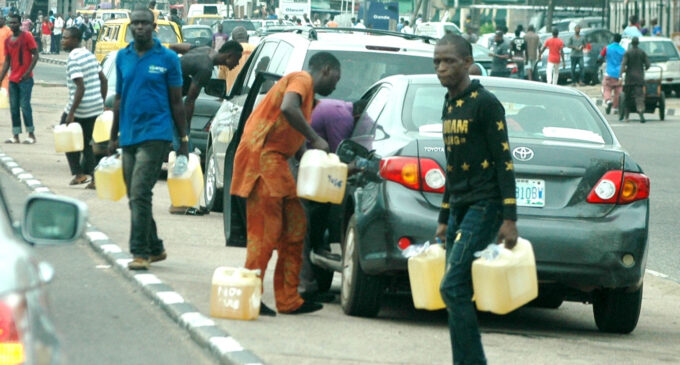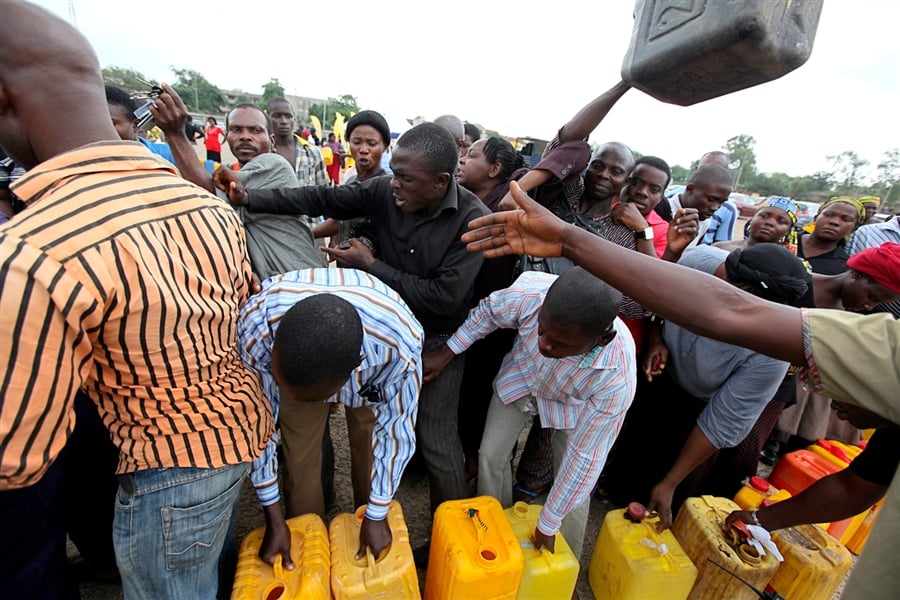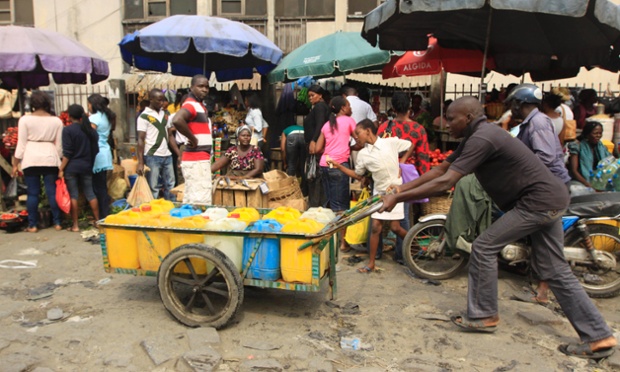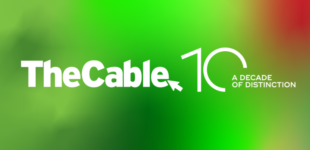Banks, airlines, schools, telcos… businesses capitulate under petroleum products’ scarcity

The acute scarcity of fuel, which has made life difficult for Nigerians since the end of April, is fast crushing economic activities in the country, as banks, airlines, radio stations and telecommunication outfits are all battling to maintain their operations.
BANKS’ EARLY CLOSURE
Already, Guaranty Trust Bank (GTB), one of the leading financial institutions in the country, has notified its customers of its intention to close four hours ahead of its usual period on Monday.
“The current shortage of petroleum products in the country has limited our ability to supply diesel to all our branches in order to continue normal branch operations,” read a statement issued by the bank late Sunday.
“Due to this, we unavoidably have to close our branches nationwide at 1pm on Monday, May 25, 2015. Whilst we have had to take this step to close branch operations early, we would like to seek your understanding at this time.”
GTB is not alone. Sterling bank has since issued a similar message to its customers; new closure time is 2pm.
RADIO STATIONS
Additionally, City 105.1 FM, Naija 102.7 FM and Beat 99.9 FM, three popular radio stations in the cosmopolitan city of Lagos, also announced the shutdown of services due to the situation on Sunday.
The stations, which normally operate on 24 hours basis, appealed to their listeners over the suspension of activities.
While Beat FM and Naija FM went off air around 8:30pm, City FM suspended its activities at 12 midnight.
TELCOS’ ALERT
In the same manner, Airtel and MTN, two notable global system of mobile communications providers in the country, also lamented the consequence of the scarcity, warning that if the situation persists, it would affect their services.
“Airtel limited wishes to inform our customers and the general public that the prevailing situation in the country regarding the scarcity of diesel and other petroleum products is presently impacting negatively our commitments to delivering best-in-class quality of service and seamless telephony experience to all Nigerians,” a statement issued by the company on Sunday, read.
Meanwhile, MTN took to its Twitter account (@MTNNG) to write: “We are also concerned that, if the situation persists, it may have adverse effects on our network, impacting both voice and data services. If diesel supplies are not received within the next 24 hours, the network will be seriously degraded and customers will feel the impact.”
Akinwale Goodluck, corporate services executive of the company, then issued another statement, saying: “The management of MTN states that the current diesel scarcity in most parts of Nigeria is posing a significant threat to quality of service and the ability to optimally operate the network.
“Most of our base stations and switches are powered round-the-clock by diesel generators and the current fuel shortage has drastically reduced the availability of diesel supply to key locations.
“MTN’s available reserves of diesel are running low and the company must source for a significant quantity of diesel in the very near future to prevent a shutdown of services across Nigeria.”
SCHOOLS, TOO…
It is the same story for Chrisland School, Lagos, which announced that the mid-term break initially scheduled for Tuesday May 26, 2015, will now begin on Monday May 25, due to prevailing shortage of diesel.
“We wish to inform you that due to the prevailing situation in the country on fuel scarcity, the primary and high schools will be closing for mid-term break on Monday 25 May 2015,” it said.
AND AIRLINES
On Sunday, Arik airline, Nigeria’s biggest carrier, operated only one-third of its schedule, canceling all domestic flights on Saturday.
Ola Banji, spokesman of the organisation, told Bloomberg that flights to Heathrow in England and New York, needed to stop over for fuel in Kano.
Also, Aero Contractors Limited, the second-largest carrier in the country, could not operate at its usual capacity.
“All our flights will not operate regularly as scheduled due to fuel scarcity,” it wrote on its website.
QUEUES WITHOUT FUEL
The impact is reverberating all round the country and Nigerians are appealing to the government to address the problem.
In Okene local government area of Kogi state, the few filling stations that have the product sell it between N140 and 150.
As at Sunday, Petrojust, one of the most popular stations in the area, was selling at the rate of N140 to an unbearably long queue of cars and gallons.
Road commuters were feeling the heat as well. A passenger who arrived Lagos from Kogi said he paid a transport fare of N3, 500 as against the normal N2,350.
In many states, commercial vehicle owners are patronising the black market, as it has become difficult to get the product at service stations.
A litre of fuel goes for N300 in the few filling stations in Lagos – after long hours of queuing , by the way – while black marketers sell from N500 upwards.
“Despite all my efforts yesterday (Saturday), I left without fuel and returned to the filling station around 6am this morning (Sunday),” Omolara Adebowale, a resident of Satellite town, told TheCable.
“I managed to get 15 litres after queuing for over six hours. The place has been very rowdy. I know what I have gone through in the last few days.”
A commercial transporter who identified himself as Wasiu Adio said he had to rely on black marketers after all efforts to get PMS at filling station came to naught.
“Passengers are not trying to cooperate. I bought a litre of fuel at the rate of N400 and they are expecting me to charge the normal fare,” explained the driver, who plies Iyano-Ipaja to Iyano-Iba route in Lagos.
“That can never happen. Anyone who knows he cannot pay N300 should alight.”
Prior to the scarcity, the transportation fare was N150.
Samuel Odunlami, a resident of Ikorodu who works at Ikeja, said he spent N500 from Ikorodu to Ketu as against the usual charge of N150.
While power generation has dropped to an all-time low of 1,327 megawatts, many are now living without electricity and they do not also have fuel to power their generators.
Gbenga Ogunyemi, a resident of the Egbeda area of Lagos, told our correspondent that due to scarcity and blackout in the area for several weeks, water vendors popularly known as ‘mei ruwa’, had been the only source of water.
As at Sunday, the price of 10 kegs of water, which sold at N200 had gone up to N500, as all but one of the borehole operators in the entire area had water.
Ogunyemi said since he was not as lucky as his neighbours who took advantage of the downpour of the previous day to store water, he had to part with such exorbitant sum of money to get water.
The Joe Ajaero-led Nigeria Labour Congress (NLC) has described the fuel scarcity as war against the citizens and a conscious attempt to subject 170 million Nigerians to economic suicide. It threatened to embark on an indefinite strike action should the scarcity continue unabated.
FRESH DEREGULATION TALKS
The Lagos chamber of commerce and industry (LCCI) has called on the incoming administration to consider the deregulation of the oil and gas downstream sector as a priority.
Speaking on Sunday, Remi Bello, president of the chamber, said only the immediate deregulation of the sector would help resolve the crisis in the country.
LCCI said corruption in the fuel subsidy regime, collapse of the country’s refineries, dwindling investment in the downstream sector and loss of jobs are among the challenges confronting the petroleum sector.
However, major marketers association of Nigeria (MOMAN), the depot and petroleum marketers association (DAPMA) and the independent petroleum marketers association of Nigeria (IPMAN), have blamed government for the situation, alleging that outstanding claims of about N200 billion has not been paid.
But Ngozi Okonjo-Iweala, minister of finance and coordinating minister of the economy, accused the marketers of blackmailing the government, saying both parties had reached the agreement that the marketers would be paid N159 billion.
While Nigerians cannot wait for the situation of things to improve, that expectation is unrealistic because of the zero provision for fuel subsidy in the recently-passed 2015 budget, which has made bankers and oil marketers to suspend financing imports of petrol and kerosene.
Most oil marketers have decided against importing fuel until the incoming government settles in and defines its direction on the deregulation of the downstream sector.
“We are stuck on all sides. The banks are unwilling to fund fuel importation because they do not want to take any risks that have political implications,” an industry source had told TheCable earlier in the month.
“They have classified it as political risk. They are not sure the incoming administration will be eager to pay up on subsidy, especially with the impression that it is all a scam.”
Already, Muhammadu Buhari, the president-elect, has suggested that he is unfavourably disposed to the idea of subsidy payments.
“When people start talking about this subsidy I honestly get confused,” Buhari said in an exclusive interview with Daily Trust.
“I will tell you this, and I hope it will answer what you want to know. Back then we had a refinery in Port Harcourt, which was refining 30,000 barrels a day of Nigerian crude. Later, it was upgraded to refine 100,000 barrels a day. Another refinery was built in Port Harcourt to refine 150,000 barrels per day of Nigerian crude.
“So, Port Harcourt alone had the capacity to refine 250,000 barrels per day of Nigerian crude. But when I found myself as the Minister of Petroleum I set up another refinery in Warri for 100, 000 barrels per day of Nigerian crude and the Kaduna refinery a 100, 000 barrels per day. So Nigeria built capacity to refine 450,000 a day, 400,00 of which is purely Nigerian crude, but 50,000 was imported.
“A number of stations were also built to take the trailers off the road, save lives and the infrastructure on the road. It is more economical because each trailer uses fuel. We did all that in this country and we didn’t borrow any money as far as I know. It’s Nigerian money. From each Nigerian crude, whether Akwa Ibom, Bonny Light or whatever it is, you can work out how much products it will give you; how much petrol it will give you; how much diesel it will give you if you want to produce diesel.
“We could tell how much Nigerian crude cost, the cost of transportation from there to the refinery, the cost of refining, the cost of transportation to the pump stations and maybe 5 per cent go for overhead. I can understand if Nigerians pay for those costs. But somebody is saying he is subsidizing Nigerians. Who is subsidizing who?”
TEMPORARY REPRIEVE?
On Sunday night, capital oil and gas industries limited, said it would release about 13 million litres, approximately 400 trucks of petroleum products, including premium motor spirit, in order to ease the scourge of the scarcity.
According to Ifeanyi Ubah, managing director of the oil firm, additional 53 million litres will be released in a few days, making a total of 70 million litres. Surely, Nigerians cannot wait to have this burden lifted, even if temporarily.
Additional reports by David Oputah


















There are no comments at the moment, do you want to add one?
Write a comment